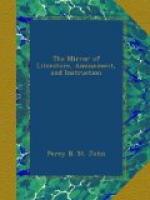Molieres, the celebrated French priest and mathematician, was a very irritable man, which led him frequently into passions, of which one was the cause of his death in 1742. In other respects he was reckoned a very amiable character; but was apt to be so absent, or absorbed in his studies, as to appear almost wholly insensible to surrounding objects. His infirmity in this respect became known, and he was accordingly made the subject of depredations. A shoe-black once finding him profoundly absorbed in a reverie, contrived to steal the silver buckles from his shoes, replacing them with iron ones. At another time, while at his studies, a villain broke into the room in which he was sitting, and demanded his money; Molieres, without rising from his studies, or giving any alarm, coolly showed him where it was, requesting him, as a great favour, that he would not derange his papers.
Ariosto, the celebrated Italian poet, being asked why he had not built his house in a more magnificent manner, and more suitable to the noble descriptions which he had given of sumptuous palaces, beautiful porticoes, and pleasant fountains, in his Orlando Furioso, he replied, “that words were combined together with less expense than stones.” To such a degree was he charmed with his own verse, and so much did he also excel in his manner of reading, that he was always disgusted if he heard his own writings repeated with an ill grace and accent. Accordingly, it is said, that, when he accidentally heard a potter singing a stanza of his Orlando in an incorrect and ungraceful manner, he was so incensed, that he rushed into his shop and broke several of the pots which were exposed to sale; when the potter expostulated with him for this unprovoked injury, Ariosto replied, “I indeed have broken half a dozen of your pots, which are not worth so many halfpence, and you have spoiled a stanza of mine, which is worth a considerable sum of gold.” He was so attached to a plain and frugal mode of life, that he says of himself in one of his poems, “that he was a fit person to have lived in the world when acorns were the food of mankind.” His constitution was delicate and infirm; and, notwithstanding his temperance and general abstemiousness, his health was often interrupted. He bore his last sickness with uncommon resolution and serenity; affirming, “that he was willing to die on many accounts, and particularly because he found that the greatest divines were of opinion that we shall know one another in the other world;” and he observed to those who were with him, “that many of his friends were departed, whom he desired to visit, and that he thought every moment tedious till he gained that happiness.”




